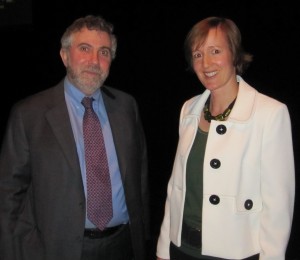By Alison van Diggelen, host of Fresh Dialogues
This exclusive interview with Nobel Prize winner, Paul Krugman was recorded on November 12, 2009 in Silicon Valley. Dr. Krugman was in town to deliver a lecture as part of the Foothill College Celebrity Forum Series. Here is the transcript of Part Two: On China and Climate Change. To listen to this interview click here and or watch video (coming soon)
Alison van Diggelen: Paul thank you very much for joining me today on Fresh Dialogues.
Paul Krugman: OK. Good to be doing this.
Alison: Talking about other countries, Spain took the lead… Denmark is taking the lead… China is now way ahead of us in certain clean energy technologies. Do you feel that we’ve lost eight years and we have at least eight years to catch up? Is it feasible we can catch up?
Paul: It’s always feasible. You don’t want to get too hung up on the specific sexy technologies. I guess the Danes are ahead of us in building wind turbines. But a lot of what we’re going to be doing on the environment is going to be… insulation, clever urban design to minimize energy loss. That’s all stuff that’s coming along and look – the history of information technology has said very clearly that nobody gets a monopoly for very long… I don’t get anxiety about it. I’m just more concerned that we won’t do what we need to do to protect the environment.
Alison: How big is the role of government? Ultimately it’s the private sector investment that’s going to make the substantial investment…
Paul: But the government has to provide the incentives…what we have now is the economic concept of an externality…if you have something where you impose costs on other people but you don’t have any incentive to reduce those costs, bad stuff happens. And climate change is the mother of all externalities. It’s a gigantic thing and the private sector by itself is not going to deal with it. Left without any government intervention, we’re just going to basically par-boil the planet, right?
So what you have to do is have a set of rules in place. Now the idea is for it to be market oriented. Yes, there can be some public research, some public investment, some things will have to be done directly by government… but mainly put in a cap and trade system – put a price on greenhouse gas emissions and then let the private sector do its stuff.
Alison: Right. Why is it you favor a cap and trade system over a straight carbon tax?
Paul: Oh, there are a couple of reasons. One is, right now, cap and trade looks like it might pass Congress and a direct tax will not. Partly that’s because cap and trade is relatively well suited to paying off the industry groups, right? We live in the real world. By handing out some of the licenses, at least in the first decade or so, you make it easier to swallow.
International coordination is easier with cap and trade. If we say to the Chinese – well we want you to have a carbon tax – how can we really tell it’s enforced? But if we negotiate with the Chinese that they will have total CO2 emissions of so much, we can monitor pretty well whether that’s actually happening. So that’s a lot easier to envision an international agreement with cap and trade.
So, I would take a carbon tax if…
Alison: If it were politically feasible?
Paul: It’s not clear to me that it’s even superior. But it would be OK, certainly. The fact is, cap and trade could be a bill by this time next year. A carbon tax is like single payer health care. It’s not going to happen this decade and I want something to actually happen now.
Alison: Paul Krugman, thank you very much I really appreciate your taking the time.
Paul: Thank you so much.
Check back soon for more interview segments on the stimulus package, what gave him that “missionary zeal” to write such fervent columns in the New York Times, and whether the green economy can be our salvation.
To check out more exclusive Fresh Dialogues interviews, click here
Listen to Part One: Paul Krugman’s advice on Obama’s Job Summit
Part Two when Paul Krugman discusses China, Climate Change and clean technology



